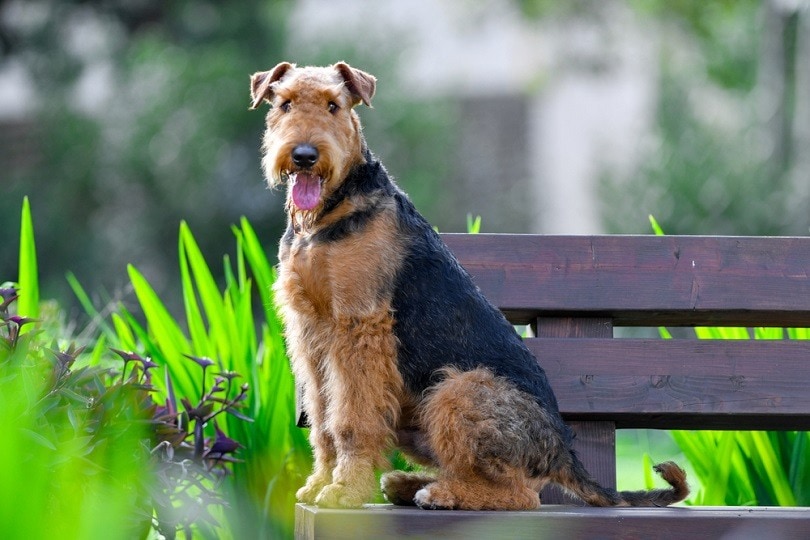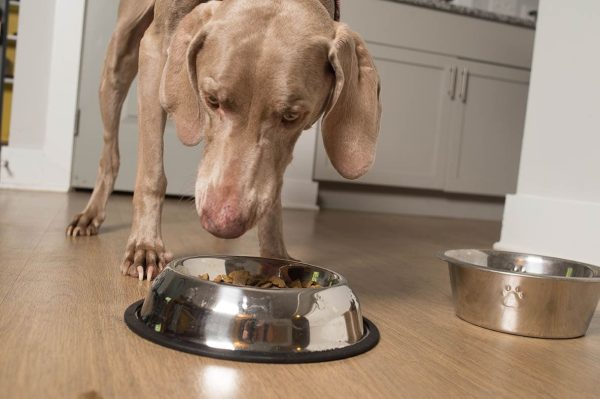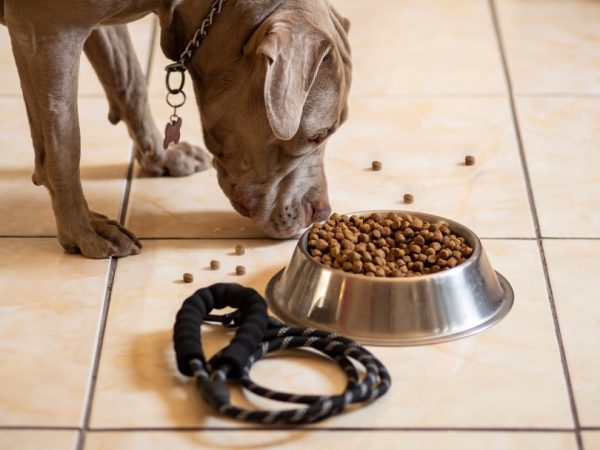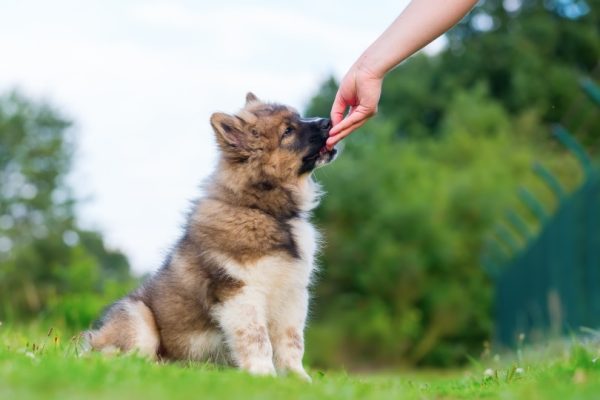In this article
You’ve just welcomed an Airedale Terrier into your life—congratulations! Now, you’re probably wondering, “How big will this little ball of fur get?” Worry not; you’ve come to the right place. In this comprehensive guide, we’ll walk you through the size and growth metrics for Airedale Terriers, factors affecting their size, and how to keep them at a healthy weight.

Airedale Terrier Overview
Meet the Airedale Terrier, the undisputed “King of Terriers.” Emanating from the Aire Valley of Yorkshire, these dogs are not just terriers supersized; they’re a blend of intelligence, agility, and willfulness.
Originating as otter and rat hunters, their job descriptions have expanded over the years. They’ve worn hats as sporting dogs and war heroes, making them the canine equivalent of a multi-talented artist.
Their versatility doesn’t stop at skills; it extends to temperament. They are smart, playful, and fearless. But be warned, they occasionally toe the line into stubborn territory.
If you’re considering adopting an Airedale, get ready for an active lifestyle. These high-energy pups need regular exercise to keep their creative minds from redesigning your furniture. Although a bit challenging for first-timers or apartment residents, their loyalty and playfulness make the effort worthwhile.
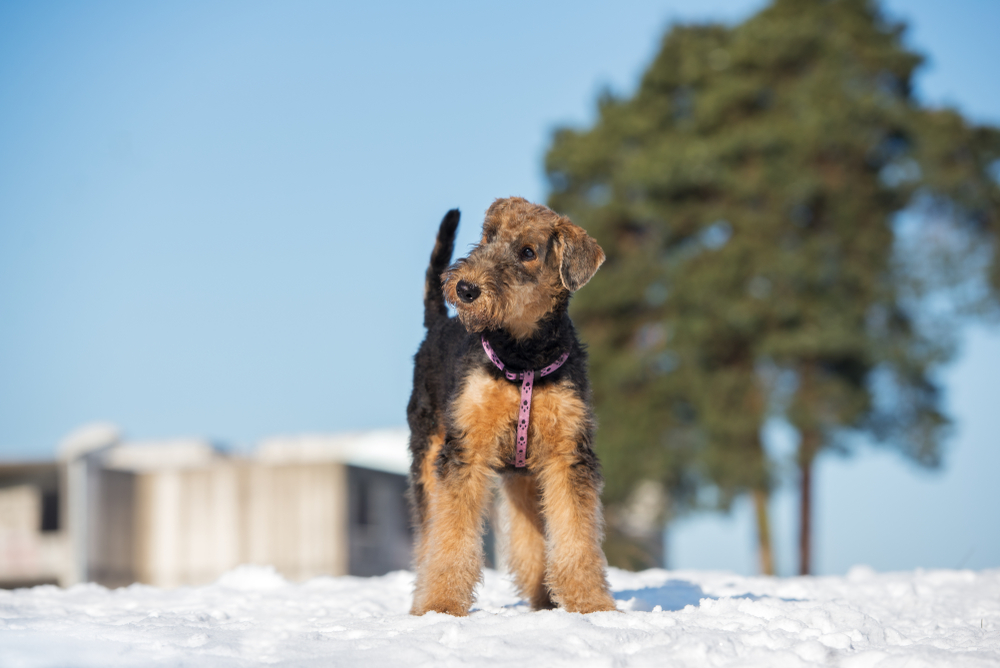
Airedale Terrier Size and Growth Chart
Like many dog breeds, Airedale Terriers look vastly different in their adult life stages compared to when they are puppies. While they start out small and compact, Airedales quickly gain height and length. Let’s explore.
| Age | Weight Range |
| 2 weeks | 2.5 pounds |
| 4 weeks | 4–5 pounds |
| 8 weeks | 10–11 pounds |
| 4 months | 24–26 pounds |
| 6 months | 34–39 pounds |
| 10 months | 39–48 pounds |
| 12 months | 40–55 pounds |
| 18 months | 50–65 pounds |
Please note this growth chart is an estimate and should only be used to get a general idea of the weight of your Airedale at different ages. There will be a variation in growth rates between different puppies. You should consult with a veterinarian if you have any concerns about your dog’s growth.
When Does an Airedale Terrier Stop Growing?
It’s the million-dollar question—or, in this case, perhaps the 65-pound question! Most Airedale Terriers stop growing between 8 and 12 months. And that’s the age you’ll likely stop wondering whether you should buy a new, bigger dog bed every week.
However, don’t get too complacent with the tape measure just yet. Airedales often continue to “fill out” until about 14 to 18 months. Think of this phase as the doggie equivalent of a late-teen human getting the last bit of muscle tone and broader shoulders.
Now, about that emotional maturity. You might see fewer instances of your pooch nipping at your heels or scattering your shoes around the house after they hit 18 months. It’s almost as though they suddenly start considering the consequences of their actions. Almost.
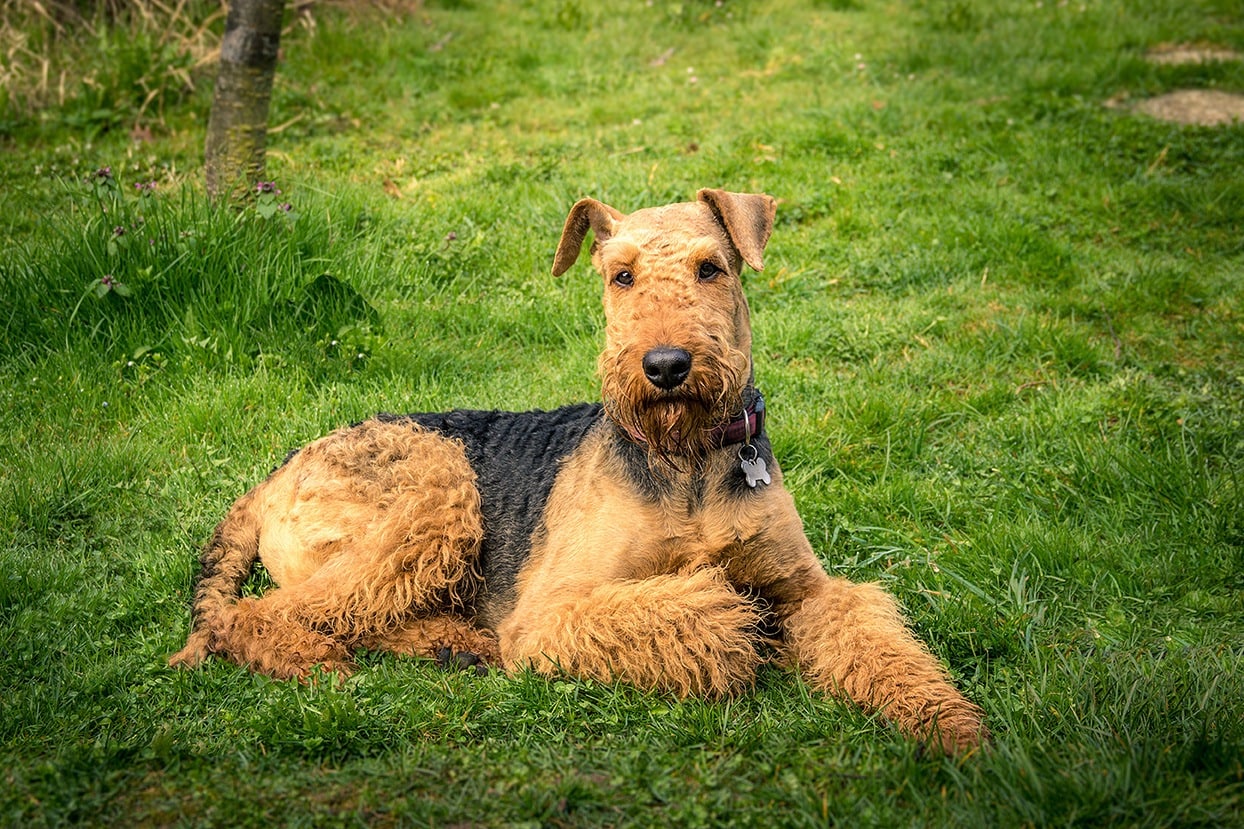
Factors Affecting the Size of Airedale Terriers
It turns out that size isn’t purely a numbers game. Several elements—some unchangeable, some adjustable—play roles in determining how big your Airedale Terrier will get.
Let’s talk about nature before nurture. Checking out Mom and Dad (the furry ones, that is!) can give you a pretty reliable hint about how large their offspring will be. If both parents are on the larger side, you might want to prepare for a robust pup.
To see to it that your dog is on the path to optimal growth, include a balanced diet rich in essential nutrients. Overshoot it, though, and you could end up with an Airedale who’s packing more pounds than muscle.
How active your Airedale Terrier is can also influence their size. Regular walks and playtime are to a dog what gym memberships are to us. With a good balance of exercise, you can expect a happy dog. However, go easy on those puppy joints; overexertion and high impact activities can lead to health issues.
Ideal Diet for Maintaining a Healthy Weight
The Airedale Terrier’s diet needs to be tailored to their individual needs. This medium-sized breed has a slight tendency to tip the scale, so let’s nip that in the bud. High-protein, low-fat is often the name of the game here.
High-quality protein builds and repairs tissue, which is especially important for these energetic furballs. Fat is also essential but in moderation, as it’s a more concentrated source of calories. Hence, lean meats like chicken, fish, and turkey often make the cut.
But before you go swapping out your dog’s dinner, consult with a veterinarian. These professionals can make recommendations based on your Airedale’s age, activity level, and overall health. The vet may suggest a dietary plan or specific dog food brands that align with your pup’s needs.
If you need to speak with a vet but can't get to one, head over to PangoVet. It's our online service where you can talk to a vet online and get the personalized advice you need for your pet — all at an affordable price!

Bear in mind that as your dog’s age or activity level changes, so will their nutritional needs. So, periodic vet checkups are a must.
How to Measure Your Airedale Terrier
Getting the right measurement for your Airedale Terrier doesn’t demand an engineering degree, but it does call for attention to detail. To start, position your Airedale on a level surface. We’re talking tile or hardwood, not a plush rug that adds an artificial inch or two.
The withers are your go-to point for accurate height measurement. That’s the peak area between the shoulder blades. Grab a tape measure, ideally one that’s stiff enough to hold its shape. Then, measure the distance from the ground to the withers. You’ve just discovered how tall your Airedale is!
Make sure you write down the measurement. This data can be helpful, especially if you’re monitoring growth in younger Airedales or discussing health matters with your vet. If necessary, a little careful planning in both diet and measurement can go a long way in ensuring your Airedale is a model canine.


Conclusion
Your Airedale Terrier is more than just numbers on a weight or height chart. These metrics serve as general guidelines to help ensure you’re on the right track in providing a healthy lifestyle for your pooch. If your dog isn’t growing as expected, or is significantly behind the weights indicated on the growth chart then check in with your vet to make sure they are growing and developing properly.
So, keep an eye on the scales, stick to an age-appropriate diet, and don’t skip those vet appointments. You’re not just raising a dog; you’re nurturing a lifetime companion.
Featured Image Credit: PROMA1, Shutterstock
